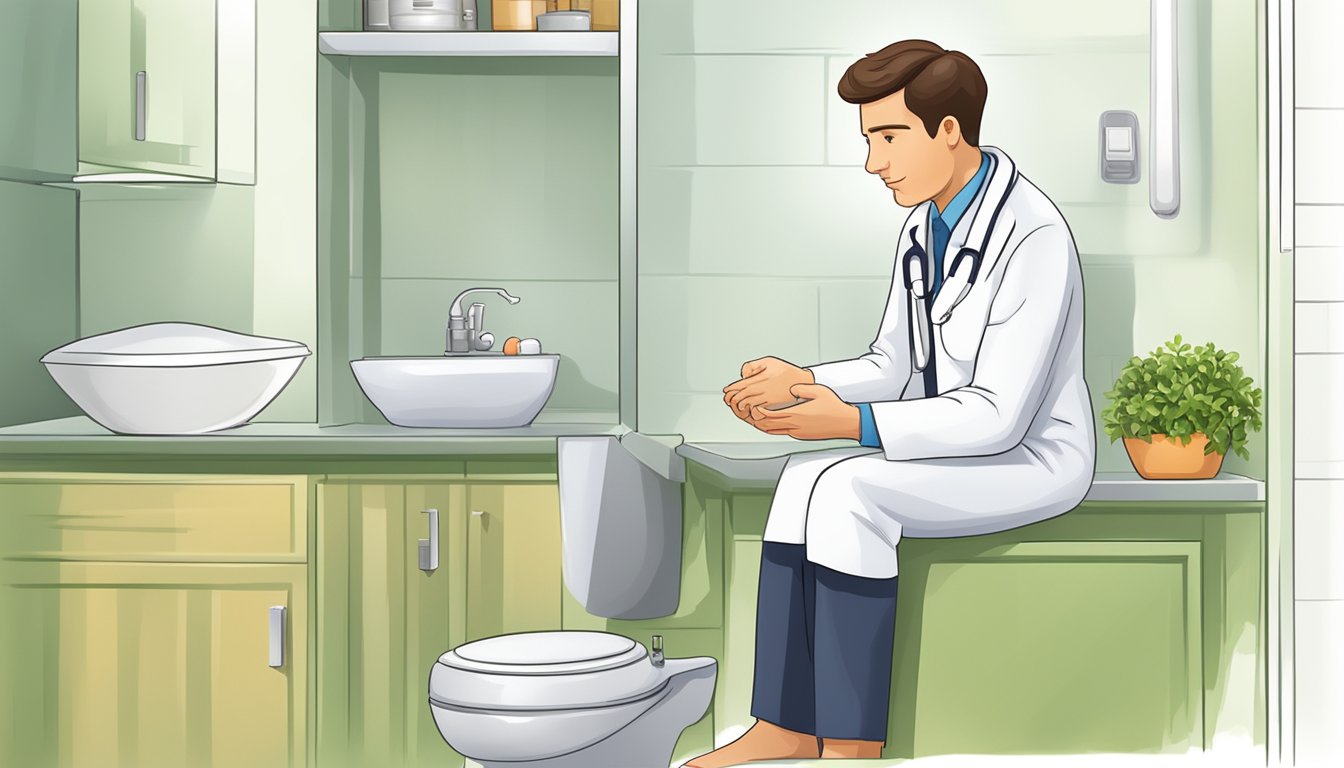TheHerbProf.com is a treasure trove of knowledge for those interested in natural healing and herbal remedies. The website is run by Paul Johnston MD. A naturopathic who has not only received extensive education in the field but also has personal experience in self-healing.
Constipation, a widespread digestive issue, impacts individuals across all age groups. It’s defined by rare bowel movements, challenges in passing stool, and a sensation of incomplete bowel clearance. While numerous factors can lead to constipation, such as a diet low in fiber, insufficient hydration, and specific medications, it can be readily controlled with some straightforward Home Remedies of Constipation.
One of the most effective ways to relieve constipation is to increase your fiber intake. Fiber helps to add bulk to the stool, making it easier to pass through the digestive tract. Some good sources of fiber include fruits, vegetables, whole grains, and legumes. Additionally, drinking plenty of water can help to soften the stool, making it easier to pass.
Another effective home remedy for constipation is exercise. Regular physical activity can help to stimulate the muscles in the digestive tract, promoting bowel movements. Even a short walk or light jog can be beneficial in relieving constipation. Additionally, certain yoga poses, such as the seated twist and the wind-relieving pose, can help to alleviate constipation by massaging the digestive organs.
Causes and Symptoms of Constipation

Constipation is a common digestive disorder that affects many people worldwide. It is characterized by infrequent bowel movements or difficulty passing stools. The following are some of the most common causes and symptoms of constipation.
Lack of Fiber in Diet
One of the most common causes of constipation is a lack of fiber in the diet. Fiber is essential for maintaining regular bowel movements because it adds bulk to the stool and helps it move through the digestive tract. Without enough fiber, the stool can become hard and difficult to pass, leading to constipation. Good sources of fiber include fruits, vegetables, whole grains, and legumes.
Dehydration
Dehydration can also cause constipation. When the body is dehydrated, it tries to conserve water by absorbing more water from the stool, making it harder and more difficult to pass. Drinking plenty of water and other fluids can help prevent constipation caused by dehydration.
Sedentary Lifestyle
A sedentary lifestyle can also contribute to constipation. Lack of physical activity can slow down the digestive system, making it harder for the stool to move through the colon. Regular exercise can help promote regular bowel movements and prevent constipation.
Certain Medications
Certain medications can also cause constipation as a side effect. These include pain medications, antacids, antidepressants, and iron supplements. If you are taking any of these medications and are experiencing constipation, talk to your doctor about possible alternatives or ways to manage the symptoms.
If you are experiencing constipation, it is important to identify the underlying cause and take steps to manage the symptoms. Making dietary changes, staying hydrated, exercising regularly, and talking to your doctor about medications and other treatments can all help alleviate constipation and promote regular bowel movements.
5 Home Remedies for Constipation
As someone who has struggled with constipation, I have found that there are several effective home remedies that can alleviate symptoms and promote regular bowel movements. Here are five remedies that have worked for me:
Increase Fiber Intake
Fiber is essential for maintaining healthy digestion and preventing constipation. You can increase your fiber intake by eating more fruits, vegetables, and whole grains. You can also take a fiber supplement, such as psyllium husk, which can help soften stool and make it easier to pass.
Drink Plenty of Water
Staying hydrated is important for preventing constipation. When you’re dehydrated, your stool can become hard and difficult to pass. Aim to drink at least eight glasses of water per day, and more if you’re exercising or sweating heavily.
Exercise Regularly
Regular exercise can help stimulate bowel movements and prevent constipation. Try to get at least 30 minutes of moderate exercise, such as brisk walking or cycling, most days of the week. If you’re new to exercise, start slowly and gradually increase your activity level.
Use Osmotic and Stimulant Laxatives
If natural remedies aren’t working, you may need to use a laxative to relieve constipation. Osmotic laxatives, such as magnesium citrate or lactulose, work by drawing water into the colon to soften stool. Stimulant laxatives, such as senna or bisacodyl, work by stimulating the muscles in the colon to contract and move stool out of the body. However, it’s important to use laxatives only as directed and not rely on them too frequently, as they can cause side effects and lead to dependence.
Try Natural Remedies
There are several natural remedies that can help relieve constipation, including:
- Prunes: Prunes are high in fiber and contain a natural laxative called sorbitol.
- Flaxseed: Flaxseed is high in fiber and can help soften stool.
- Aloe vera: Aloe vera juice can help soothe and lubricate the digestive tract.
- Ginger: Ginger can help stimulate digestion and relieve constipation.
Incorporating these remedies into your daily routine can help promote regular bowel movements and prevent constipation. However, if you’re experiencing severe or chronic constipation, it’s important to talk to your doctor to rule out any underlying medical conditions.
Home Remedies for Constipation in Specific Groups

Children
Constipation is a common problem in children, but it can be treated with simple home remedies. It is important to encourage children to drink plenty of fluids, especially water. Dehydration can make constipation worse, so it is important to make sure that children are drinking enough water.
Fiber is also important for children who are constipated. Foods that are high in fiber include fruits, vegetables, and whole grains. Encouraging children to eat these foods can help to relieve constipation.
In addition to dietary changes, there are other home remedies that can help to relieve constipation in children. These include:
- Encouraging physical activity: Exercise can help to stimulate bowel movements.
- Using a warm compress: Placing a warm compress on the abdomen can help to relieve constipation.
- Trying a glycerin suppository: Glycerin suppositories can help to soften the stool and make it easier to pass.
Pregnant Individuals
Constipation is a common problem during pregnancy due to hormonal changes and the pressure that the growing uterus puts on the intestines. However, there are several home remedies that can help to relieve constipation in pregnant individuals.
First and foremost, it is important to stay hydrated by drinking plenty of water. Pregnant individuals should aim to drink at least eight glasses of water per day.
Fiber is also important for pregnant individuals who are constipated. Foods that are high in fiber include fruits, vegetables, and whole grains. It may also be helpful to take a fiber supplement, but pregnant individuals should speak to their doctor before taking any supplements.
Other home remedies that can help to relieve constipation during pregnancy include:
- Engaging in regular physical activity: Exercise can help to stimulate bowel movements.
- Using a stool softener: Stool softeners can help to soften the stool and make it easier to pass.
- Trying a glycerin suppository: Glycerin suppositories can help to stimulate bowel movements. However, pregnant individuals should speak to their doctor before using a suppository.
When to Seek Medical Attention for Constipation

Constipation is a common problem that can usually be treated with home remedies. However, in some cases, constipation can be a sign of a more serious condition. Here are some situations where you should seek medical attention for constipation:
Chronic Constipation
If you have been experiencing constipation for more than three weeks, it is considered chronic. Chronic constipation can be a sign of an underlying medical condition, such as irritable bowel syndrome (IBS), hypothyroidism, or colon cancer. It is important to see a doctor if you have chronic constipation to rule out any serious conditions.
Severe Constipation
If you have not had a bowel movement in more than a week, or if you are experiencing severe pain or bleeding during bowel movements, you should see a doctor immediately. These symptoms can be a sign of a blockage in your colon or rectum, which requires immediate medical attention.
Lifestyle Changes to Prevent Constipation
If you are experiencing constipation, there are some lifestyle changes you can make to help prevent it from becoming a chronic or severe problem. These include:
- Drinking plenty of water
- Eating a high-fiber diet
- Exercising regularly
- Avoiding processed foods and sugary drinks
- Taking regular breaks to go to the bathroom
If you have tried these lifestyle changes and are still experiencing constipation, it may be time to see a doctor. They can help you determine the underlying cause of your constipation and recommend appropriate treatment options.
Remember, while constipation is a common problem, it can sometimes be a sign of a more serious condition. If you are experiencing chronic or severe constipation, or if you are experiencing pain or bleeding during bowel movements, it is important to seek medical attention.
Can Herbal Tea Cause Constipation

I have come across various claims that herbal tea can cause constipation. However, according to my research, there is no scientific evidence to support this claim.
In fact, some herbal teas can actually help relieve constipation. For example, teas containing senna or cascara can have a laxative effect and help stimulate bowel movements.
That being said, it is important to note that excessive consumption of any tea, including herbal tea, can cause dehydration, which can lead to constipation. Therefore, it is important to drink plenty of water and limit your intake of tea, especially if you are experiencing constipation.
Additionally, some herbal teas may interact with certain medications, so it is important to consult with your healthcare provider before incorporating any new teas into your diet.
Overall, while herbal tea is generally safe and can even be beneficial for relieving constipation, it is important to consume it in moderation and consult with a healthcare provider if you have any concerns or questions.
Herbal Remedies for Constipation

As someone who has suffered from constipation in the past, I have found that herbal remedies can be effective in relieving this uncomfortable condition. Here are some herbal remedies that I have found helpful:
Senna
Senna is a natural laxative that comes from the leaves of the Senna plant. It works by stimulating the muscles of the colon, which helps to move stool through the intestines. Senna is available in tea form, as well as in capsules or tablets. It is important to follow the recommended dosage on the packaging, as excessive use of senna can lead to diarrhea and dehydration.
Peppermint Tea
Peppermint tea is another natural remedy that can help to relieve constipation. The menthol inside peppermint contains menthol, have a relaxing effect on the muscles of the digestive tract. It can also help to reduce inflammation in the intestines, which can contribute to constipation. Drinking a cup of peppermint tea after a meal can help to promote digestion and relieve constipation.
Ginger
Ginger is a natural anti-inflammatory and can help to reduce inflammation in the intestines. It can also help to stimulate digestion and relieve constipation. Ginger can be consumed in many forms, including tea, capsules, or fresh ginger root.
Dandelion
Dandelion is another natural laxative that can help to relieve constipation. It works by stimulating the production of bile, which helps to break down fats and move stool through the intestines. Dandelion can be consumed in tea form, as well as in capsules or tablets.
Black Tea, Green Tea, or Coffee
Black tea, green tea, and coffee all contain caffeine, which can help to stimulate the muscles of the digestive tract and promote bowel movements. However, it is important to consume these beverages in moderation, as excessive caffeine consumption can lead to dehydration and other health problems.
Licorice Root
Licorice root is a natural laxative that can help to relieve constipation. It works by stimulating the production of mucus in the intestines, which helps to lubricate stool and move it through the digestive tract. Licorice root can be consumed in tea form, as well as in capsules or tablets.
Marshmallow Root
Marshmallow root is another natural remedy that can help to relieve constipation. It works by coating the digestive tract with a protective layer of mucus, which helps to reduce inflammation and promote bowel movements. Marshmallow root can be consumed in tea form, as well as in capsules or tablets.
Chamomile
Chamomile is a natural anti-inflammatory and can help to reduce inflammation in the intestines. It can also help to relax the muscles of the digestive tract and promote bowel movements. Chamomile can be consumed in tea form, as well as in capsules or tablets.
Parsley
Parsley is a natural diuretic and can help to increase urine output, which can help to relieve constipation. It can also help to reduce inflammation in the intestines and promote digestion. Parsley can be consumed in many forms, including fresh parsley leaves, tea, or capsules.
These herbal remedies can be effective in relieving constipation, but it is important to consult with a healthcare provider before using any new remedies, especially if you have a medical condition or are taking medication.
Before You Go – Home Remedies of Constipation

In conclusion, constipation is a common digestive issue that can be treated with a variety of home remedies. Drinking plenty of water, eating high-fiber foods, and engaging in regular exercise are all effective ways to relieve constipation. Additionally, certain foods such as prunes, kiwis, and flaxseeds have been shown to have laxative effects and can be incorporated into the diet.
It is important to note that if constipation persists or is accompanied by severe pain, bleeding, or other symptoms, medical attention should be sought. Over-the-counter and prescription medications are available to treat constipation, but should only be used under the guidance of a healthcare provider.
Overall, by making simple lifestyle changes and incorporating natural remedies, many cases of constipation can be effectively managed at home.
References – Home Remedies of Constipation
Little Herb Encyclopedia, by Jack Ritchason; N.D., Woodland Publishing Incorporated, 1995
The Ultimate Healing System, Course Manual, Copyright 1985, Don Lepore
Planetary Herbology, Michael Tierra, C.A., N.D., Lotus Press, 1988
Handbook of Medicinal Herbs, by James A. Duke, Pub. CRP Second Edition 2007
The Complete Medicinal Herbal, by Penelope Ody, Published by Dorling Kindersley
Check the Following Articles!
Home Remedies of Cough: Natural Solutions for Fast Relief
Herb Tea: A Guide to Its Health Benefits and How to Make It
Home Remedies of Heartburn: Cure Your Symptoms Now!
Linking Home Remedies of Constipation to TheHerbProf
Home remedies for constipation and TheHerbProf are like two peas in a pod! They complement each other perfectly, providing a holistic approach to digestive health.
At TheHerbProf, we’re all about natural remedies and healthy living. Our website is a treasure trove of information on herbs, their benefits, and how to use them effectively. You can click here for our home page.
Now, let’s talk about constipation. It’s a common issue that many people face. But don’t worry, nature has got us covered! There are numerous home remedies for constipation that can help get things moving again.
When you combine the knowledge from our website with these home remedies, you’re equipping yourself with a powerful toolkit to combat constipation.
For instance, did you know that certain herbs can help alleviate constipation? That’s right! Herbs like psyllium husk, flax seeds, and aloe vera are known for their laxative properties. You can find more about these herbs on our website.
So, whether you’re sipping on a warm cup of herbal tea or trying out a new recipe with flax seeds, remember that TheHerbProf is here to guide you on your journey to better digestive health.
And remember, laughter is the best medicine! So, keep a light heart and a healthy gut. Happy herb-ing!
Frequently Asked Questions – Home Remedies of Constipation

What are some natural ways to relieve constipation quickly?
If you are looking for a quick natural remedy for constipation, try drinking warm water or herbal tea. You can also try massaging your abdomen or doing some light exercise, such as walking or yoga. Another option is to use a natural laxative, such as psyllium husk or aloe vera.
What are some effective home remedies for constipation?
There are several effective home remedies for constipation, including:
- Eating more fiber-rich foods, such as fruits, vegetables, and whole grains
- Drinking plenty of water and other fluids
- Taking a probiotic supplement or eating probiotic-rich foods, such as yogurt or kefir
- Using natural laxatives, such as prune juice or flaxseed oil
- Massaging your abdomen or doing some light exercise, such as walking or yoga
What are some foods that can help relieve constipation?
Foods that are high in fiber can help relieve constipation. Some examples include:
- Fruits, such as apples, pears, and berries
- Vegetables, such as broccoli, carrots, and spinach
- Whole grains, such as brown rice and quinoa
- Legumes, such as lentils and chickpeas
- Nuts and seeds, such as almonds and chia seeds
Can drinking water help with constipation?
Yes, drinking water can help with constipation. When you are dehydrated, your stool can become hard and difficult to pass. Drinking plenty of water and other fluids can help soften your stool and make it easier to pass.
What are some lifestyle changes that can help prevent constipation?
Some lifestyle changes that can help prevent constipation include:
- Eating a diet that is high in fiber and drinking plenty of water
- Exercising regularly
- Going to the bathroom when you feel the urge to have a bowel movement
- Avoiding foods that can cause constipation, such as processed foods and dairy products
- Managing stress, as stress can contribute to constipation
When should I see a doctor for constipation?
If you have tried home remedies for constipation and they have not worked, or if you have other symptoms such as abdominal pain or blood in your stool, you should see a doctor. Additionally, if you have chronic constipation or if you are experiencing constipation along with other symptoms, such as weight loss or fatigue, you should see a doctor.


